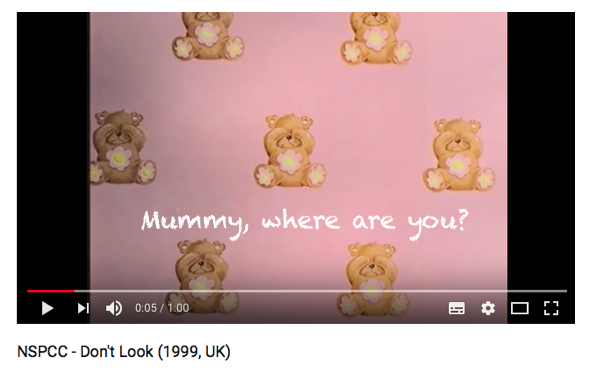NSPCC’s Full Stop campaign — SOFII’s view
- Exhibited by
- Ken Burnett
- Added
- March 15, 2018
- Medium of Communication
- Target Audience
- Type of Charity
- Country of Origin
- Date of first appearance
SOFII’s view
Ken Burnett gives the final say on the fascinating and inspirational story of the NSPCC's Full Stop campaign, with links to the seven sections so you can enjoy the chronicle yourself.
SOFII’s Best of the Best
Superlatives such as ‘ground-breaking’, ‘game-changing’ and ‘transformational’ are often sprayed around in marketing and communications circles, so much so that they can lose their power and meaning.
The NSPCC’s Full Stop campaign is an exception. Here, those words really do apply, and more.

This was the most ambitious appeal of its kind in the UK, bar none. Few other public campaigns anywhere have come close to it. It called for extraordinary vision, ambition and meticulous planning. It raised a colossal £274 million plus. It mobilised a nation, inspiring and engaging people of all ages, types and backgrounds from every corner of Britain and British society. It grew and transformed what was already one of the UK’s most successful causes, becoming a rising tide that lifted all boats. It was innovative, integrated, truly multimedia, diverse and comprehensive, featuring almost every kind of fundraising. It recruited an army of new donors and volunteers. It was bold, brave, determined and controversial, for it set out from the start to achieve an impossible dream – the ending of child abuse. A dream? Certainly. Impossible? Perhaps. But still something so well worth striving for, something donors and potential donors everywhere embraced and rallied enthusiastically behind.
‘We were worried that existing patrons would be bored. We couldn’t have been more wrong. Existing patrons loved to see others join their ‘club’, which is what they became. A club of people, who had made a really significant financial contribution, meeting each other once a year and enjoying each other’s company. When added together, as a single group, they had raised £70m since launch.’ From Full Stop Part 5: recognition and reconciliation.
This is the biggest case history on SOFII and it leaps into SOFII’s Best of the best category, no argument. It is also one of the best stories SOFII can tell, a story that truly illustrates what SOFII is for. Its lessons are relevant to all ambitious fundraisers everywhere.
For all the above reasons we urge you to read it, to allow ample time for it, to take notes as you go through it so that you can absorb its many lessons then apply those that are relevant to advance your fundraising, so your organisation too can benefit from this remarkable, unique achievement. That’s why SOFII has told this story. For the story to work it needs you, your openness and willingness to learn.
The architect of this exceptional success story is Giles Pegram CBE, one of the UK’s most respected and prominent fundraising figures. Giles is a long-standing supporter and friend of SOFII and we are truly delighted that this story is now here, complete and freely available 24/7 for fundraisers all over the world to enjoy and benefit from. Credit for editing and finalising this massive feature must also go to Joe Burnett, SOFII’s contributing editor. If you were a part of NSPCC at the time and have additional lessons to share or if you’ve done something similar in your organisation, please share with others by adding your comments and observations below or on the exhibit’s other pages, as you read them.
It is a thrilling story too – how the target was set, the importance of setting it high, building the dream, the challenges of recruiting and motivating volunteer committees, keeping people performing at optimum, planning, revising, working with suppliers, industry sectors and volunteer groups, strategies for recognition and reward, the emotions, trials, tribulations and achievements that studded its progress. And much, much more. In seven full and frank articles Giles Pegram tells the full, unvarnished story with passion and candour, sharing openly and freely a host of lessons from this great undertaking.

All seven parts are linked here for you, now.
- The NSPCC Full Stop campaign, part 1: building the foundations.
- The NSPCC Full Stop campaign, part 2: the launch and beyond.
- The NSPCC Full Stop campaign, part 3: the appeal.
- The NSPCC Full Stop campaign, part 4: final challenges.
- The NSPCC Full Stop campaign, part 5: recognition and consolidation.
- The NSPCC Full Stop campaign, part 6: after the appeal.
- The NSPCC Full Stop campaign, appendix.
For another earlier (1984) yet still truly transformational and ground-breaking campaign from NSPCC, see their three-part Centenary Appeal, on SOFII here.


















